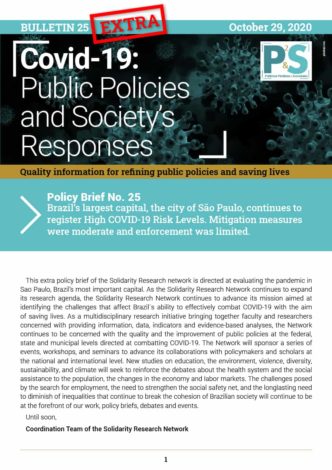Main conclusions
- According to the classification of the Harvard Global Health Institute, the COVID-19 risk level in the state capital of São Paulo continues to be moderate-high. This level has persisted since the beginning of May.
- According to data from the São Paulo State Health Department (Secretaria Estadual de Saúde in Portuguese), there were 12,266 deaths from COVID-19 by September 17 in the state capital. However, data from the São Paulo Municipal Health Department (Secretaria Municipal de Saúde in Portuguese), the total number of COVID-19 deaths is substantially higher than the previous figure, with 19,033 deaths (13,244 confirmed deaths and 5,789 suspected deaths).
- Data regarding the place of residence of people who died from COVID-19 suggests that deaths do not occur equally high in all neighborhoods. The highest number of deaths were recorded in May in the subprefectures of Casa Verde, Parelheiros, Santo Amaro, Mooca, and Freguesia do Ó, where COVID-19 death rates per 100 thousand inhabitants varied between 50 and 59.9.
- Since the enactment of the São Paulo Plan, intending to organize the state’s economic reopening, the capital has remained at intermediate levels of activity restrictions according to the state’s classification.
- New data gathered by the Solidarity Research Network suggests that the effectiveness of the policies restricting economic activities and mobility during the pandemic were impaired by a lack of enforcement actions by city officials.
- The Solidarity Research Network also reveals data transparency and availability regarding the efforts directed at enforcement of violations of restrictive measures aimed at curbing the spread of COVID-19 are lacking. We only obtained monitoring data upon several requests to the subprefectures and the Municipal Subprefectures Secretariat; furthermore, the quality of the information hindered a detailed analysis of the city’s enforcement strategy.
Work group responsible
Coordination: Lorena Barberia (USP), Carolina Langbeck Osse (USP) e Raquel Requena Rachid (PUC)
Collaborators
- Tatiane C Moraes de Sousa (Fiocruz)
- Dara Aparecida (DCP-USP)
- Luiz Guilherme Roth Cantarelli (DCP-USP)
- Maria Letícia Claro (DCP-USP)
- Isabel Seelaender Costa Rosa (DCP-USP)
- Pedro H. de Santana Schmalz (DCP-USP e CEPESP/ FGV)
- Marcela Mello Zamudio (DCP-USP e CEPESP/FGV)


